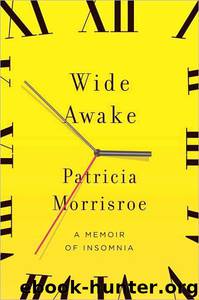Wide Awake: What I Learned About Sleep From Doctors, Drug Companies, Dream Experts, and a Reindeer Herder in the Arctic Circle by Patricia Morrisroe

Author:Patricia Morrisroe
Language: eng
Format: mobi
Tags: Non-Fiction
ISBN: 038552224X
Publisher: Spiegel & Grau
Published: 2010-05-04T10:00:00+00:00
While Buzz donuts aren’t included in the military’s standard rations, when it comes to keeping soldiers alert, nothing is too extreme. Sleep is a major factor in winning wars; without it, soldiers suffer lapses in attention, judgment, and memory that can lead to fatal mistakes. That’s why humans are often described as the “weakest link” in warfare. While on special ops, soldiers often need to be awake for seventy-two hours straight; pilots may need to fly continuously for thirty hours or more. “In terms of pure survival, three hours of sleep is okay as long as your decisions aren’t critical,” Dr. Gregory Belenky told me. Once the top sleep researcher at the Walter Reed Army Institute of Research, he now directs the Sleep and Performance Research Center at Washington State University, Spokane. “Sleep deprivation doesn’t impair physical strength, endurance, or coordination,” he explained, “but to really be able to think and plan—the two areas most degraded by sleep deprivation—most people need eight hours.”
While the Pentagon spends tens of billions of dollars on the most advanced weaponry, sleepy soldiers are still primarily dependent on the old military standbys: caffeine and amphetamines. In 2003 the military’s use187 of Dexedrine or “go pills” came under scrutiny when two U.S. Air Force majors killed four Canadians in a friendly-fire incident in Tarnak Farm, near Kandahar, Afghanistan. During a pretrial hearing—the two air force majors faced court-martial—one of the defense lawyers claimed that the pilots had been pressured to take Dexedrine, which had impaired their judgment. Despite the drug’s potential for abuse, Dr. John Caldwell, a former principal research psychologist for the U.S. Air Force’s Warfighter Fatigue Countermeasures Group, has said that when it comes to a lengthy mission, “I’ll fly with the guy188 on Dexedrine any day of the week.”
Eager to find a stimulant with fewer side effects, the military has investigated the use of modafinil, which was given to French foreign legion troops189 during the first Gulf War and possibly to British troops—the British Ministry of Defense190 has been buying it since 1998. The U.S. Air Force has approved191 the drug for management of aircrew fatigue for some bomber missions, although it still prefers go pills. Given the relatively few options available, in 2002 the government initiated the Preventing Sleep Deprivation Program192 under the auspices of the Defense Advanced Research Projects Agency (DARPA), the Pentagon’s premiere research division, whose mandate is to maintain technological superiority for the U.S. military. The agency was created193 in 1958 after the United States was caught off guard when the Soviets launched Sputnik. To make sure something like that never happened again, DARPA was encouraged to pursue cutting-edge science and technology. Along with such notable hits194 as the Internet, the Global Positioning System, the stealth aircraft, and night vision, the agency has had a number of bizarre failures, including the telepathic spy program that attempted to use psychics to carry out remote espionage and, more recently, a terrorism futures market in which speculators could bet on future assassinations and bombings in the Middle East.
Download
This site does not store any files on its server. We only index and link to content provided by other sites. Please contact the content providers to delete copyright contents if any and email us, we'll remove relevant links or contents immediately.
We're Going to Need More Wine by Gabrielle Union(19034)
Pimp by Iceberg Slim(14489)
Bombshells: Glamour Girls of a Lifetime by Sullivan Steve(14058)
The Radium Girls by Kate Moore(12018)
Becoming by Michelle Obama(10021)
Educated by Tara Westover(8047)
The Girl Without a Voice by Casey Watson(7885)
Wiseguy by Nicholas Pileggi(5770)
The Wind in My Hair by Masih Alinejad(5092)
Hitman by Howie Carr(5089)
The Rules Do Not Apply by Ariel Levy(4957)
Hunger by Roxane Gay(4922)
On the Front Line with the Women Who Fight Back by Stacey Dooley(4870)
Year of Yes by Shonda Rhimes(4755)
The Borden Murders by Sarah Miller(4313)
Papillon (English) by Henri Charrière(4263)
Joan of Arc by Mary Gordon(4101)
American Kingpin by Nick Bilton(3876)
Patti Smith by Just Kids(3774)
